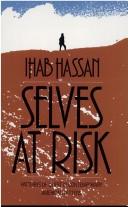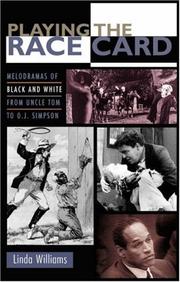| Listing 1 - 6 of 6 |
Sort by
|
Book
ISBN: 0807119881 9780807119884 Year: 1995 Publisher: Baton Rouge Louisiana State University Press
Abstract | Keywords | Export | Availability | Bookmark
 Loading...
Loading...Choose an application
- Reference Manager
- EndNote
- RefWorks (Direct export to RefWorks)
"The first full realization of the family saga in the southern tradition, Stephens says, was George Washington Cable's The Grandissimes (1880)."--BOOK JACKET. "Stephens gives an extensive tour of twentieth-century authors who have used and further developed the southern family saga. He examines the works of writers such as T. S. Stribling and William Faulkner, who after the First World War reinterpreted the Civil War and its consequences in terms of a displaced inheritance; Caroline Gordon, Allen Tate, and Andrew Lytle, who built on the displacement motif to show family decline; Katherine Anne Porter, Eudora Welty, and Shirley Ann Grau, who in focusing on family stories transmitted by women explored implications of the matriarchal-patriarchal conflict resonating through generations; and Margaret Walker, Alex Haley, Ernest Gaines, and Toni Morrison, who showed the black family's struggle to find a place in history and later in memories of legendary Africa. Authors whom Stephens identifies as third-generation writers, such as Reynolds Price and Lee Smith, reach beyond history in their sagas to find moments of mythic vision, or they reduce family and public history to the pastless present of popular culture."--BOOK JACKET. "The literary tradition of the family saga thrives in the South today, Stephens says, because there exists an operative context in which to read the saga: namely, some version of providential order, which affords glimpses of purpose beyond the daily struggles of generations. The Family Saga in the South will make an inestimable contribution to understanding this vital tradition in southern letters while pointing the way for study of the genre in other cultures."--BOOK JACKET.
Domestic fiction [American ] --- Southern States --- History and criticism --- Southern States in literature --- Historical fiction [American ] --- Faulkner, William --- Criticism and interpretation --- Stribling, Thomas Sigismund --- Gordon, Caroline --- Tate, Allen --- Porter, Katherine Anne --- Welty, Eudora --- Walker, Margaret Abigail --- Haley, Alex Palmer --- Gaines, Ernest J. --- Morrison, Toni --- Smith, Lee --- Grau, Shirley Ann --- American fiction --- Domestic fiction, American --- Historical fiction, American --- Families in literature --- Family in literature --- In literature.

ISBN: 9780807133224 Year: 2008 Publisher: Baton Rouge Louisiana State University Press
Abstract | Keywords | Export | Availability | Bookmark
 Loading...
Loading...Choose an application
- Reference Manager
- EndNote
- RefWorks (Direct export to RefWorks)
Slavery in literature --- Mitchell, Margaret --- Bontemps, Arna Wendell --- Elkins, Stanley --- Styron, William, 1925-2006. The Confessions of Nat Turner --- Morrison, Toni --- Gaither, Frances --- Jones, Edward P. --- Butler, Octavia E. --- Chopin, Kate O'Flaherty --- Douglass, Frederick --- Haley, Alex Palmer --- Martin, Valerie --- Onstott, Kyle --- Reed, Ishmael --- Walker, Margaret Abigail --- Williams, Sherley Anne

ISBN: 0671253727 Year: 1979 Publisher: New York
Abstract | Keywords | Export | Availability | Bookmark
 Loading...
Loading...Choose an application
- Reference Manager
- EndNote
- RefWorks (Direct export to RefWorks)
American literature --- Thematology --- Race relations in literature --- Rassenverhoudingen in de literatuur --- Relations raciales dans la littérature --- American fiction --- History and criticism --- African Americans in literature --- Epic literature [American ] --- Popular literature --- United States --- Slavery in literature --- Stowe, Harriet Elizabeth Beecher --- Mitchell, Margaret --- Haley, Alex Palmer --- African Americans in literature. --- Epic literature, American --- Race relations in literature. --- Slavery in literature. --- History and criticism. --- Uncle Tom --- Stowe, Harriet Beecher,

ISBN: 0299123707 029912374X Year: 1990 Volume: *5 Publisher: Madison, Wis. University of Wisconsin Press
Abstract | Keywords | Export | Availability | Bookmark
 Loading...
Loading...Choose an application
- Reference Manager
- EndNote
- RefWorks (Direct export to RefWorks)
American literature --- Thematology --- anno 1900-1999 --- Quests (Expeditions) in literature --- Quests in literature --- Quêtes (Expéditions) dans la littérature --- Quêtes (littérature) --- Quêtes dans la littérature --- Voyage initiatique (littérature) --- Zoektochten (Expeditie) in de literatuur --- Zoektochten in de literatuur --- American prose literature --- History and criticism. --- 20th century --- History and criticism --- Bowles, Paul Frederick --- Criticism and interpretation --- Theroux, Paul --- Matthiessen, Peter --- Collins, Michael --- Didion, Joan --- Dillard, Annie --- Haley, Alex Palmer --- Arlen, Michael --- Clark, Eleanor --- McPhee, John --- Hoagland, Edward --- Morris, Mary --- Zweig, Paul --- Doerr, Harriet --- Dickey, James --- Bellow, Saul --- Mailer, Norman
Book
ISBN: 0313287643 Year: 1993 Publisher: Westport London Greenwood Press
Abstract | Keywords | Export | Availability | Bookmark
 Loading...
Loading...Choose an application
- Reference Manager
- EndNote
- RefWorks (Direct export to RefWorks)
Bambara, Toni Cade --- Conroy, Pat --- Edgerton, Clyde C. --- Ford, Richard --- Godwin, Gail --- Haley, Alex Palmer --- Hannah, Barry --- Humphrey, William --- Humphreys, Josephine --- Jones, Gayl --- Jones, Madison Percy --- Mason, Bobbie Ann --- McPherson, James Alan --- Phillips, Jayne Anne --- Powell, Padgett --- Smith, Lee --- Tyler, Anne --- Walker, Alice, 1944 --- -Willingham, Calder Baynard, Jr. --- Dubus, André --- Adams, Alice Boyd --- Alther, Lisa --- Bell, Madison Smartt --- Brown, Lawrence --- Brown, Rita Mae --- Corrington, John William --- Haxton, Josephine Ayres --- Ehle, John Marsden --- Ford, Jesse Hill --- Gibbons, Kaye --- Gilchrist, Ellen --- Gingher, Marianne --- Hoffman, [Henry] William --- Lowry, Beverly (Fey) --- McCarthy, Cormac --- McCorkle, Jill (Collins) --- McLaurin, Tim --- Morgan, Berry --- Norris, Hellen --- Pearson, Thomas Reid --- Portis, Charles (McColl) --- Sams, Ferrol --- Settle, Mary Lee --- Shacochis, Robert G. --- Shreve, Susan Richards --- Toole, John Kennedy --- Wilcox, James --- Wilkinson, Sylvia --- Yount, John Alonzo

ISBN: 0691058008 Year: 2001 Publisher: Princeton, N.J. Princeton University Press
Abstract | Keywords | Export | Availability | Bookmark
 Loading...
Loading...Choose an application
- Reference Manager
- EndNote
- RefWorks (Direct export to RefWorks)
The black man suffering at the hands of whites, the white woman sexually threatened by the black man. Both images have long been burned into the American conscience through popular entertainment, and today they exert a powerful and disturbing influence on Americans' understanding of race. So argues Linda Williams in this boldly inquisitive book, where she probes the bitterly divisive racial sentiments aroused by such recent events as O. J. Simpson's criminal trial. Williams, the author of Hard Core, explores how these images took root, beginning with melodramatic theater, where suffering characters acquire virtue through victimization. The racial sympathies and hostilities that surfaced during the trial of the police in the beating of Rodney King and in the O. J. Simpson murder trial are grounded in the melodramatic forms of Uncle Tom's Cabin and The Birth of a Nation. Williams finds that Stowe's beaten black man and Griffith's endangered white woman appear repeatedly throughout popular entertainment, promoting interracial understanding at one moment, interracial hate at another. The black and white racial melodrama has galvanized emotions and fueled the importance of new media forms, such as serious, "integrated" musicals of stage and film, including The Jazz Singer and Show Boat. It also helped create a major event out of the movie Gone With the Wind, while enabling television to assume new moral purpose with the broadcast of Roots. Williams demonstrates how such developments converged to make the televised race trial a form of national entertainment. When prosecutor Christopher Darden accused Simpson's defense team of "playing the race card," which ultimately trumped his own team's gender card, he feared that the jury's sympathy for a targeted black man would be at the expense of the abused white wife. The jury's verdict, Williams concludes, was determined not so much by facts as by the cultural forces of racial melodrama long in the making. Revealing melodrama to be a key element in American culture, Williams argues that the race images it has promoted are deeply ingrained in our minds and that there can be no honest discussion about race until Americans recognize this predicament.
Sociology of minorities --- Sociology of culture --- United States --- African Americans in mass media --- African Americans in popular culture --- Afro-Americains dans la culture populaire --- Afro-Amerikanen in de massamedia --- Afro-Amerikanen in de volkscultuur --- Afro-américains dans les mass media --- Racism in popular culture --- -Melodrama, American --- -Mass media and race relations --- -African Americans in mass media --- African American men --- -White women --- -Popular culture --- #SBIB:309H525 --- #SBIB:309H402 --- #SBIB:316.7C200 --- #SBIB:023.AANKOOP --- Culture, Popular --- Mass culture --- Pop culture --- Popular arts --- Communication --- Intellectual life --- Mass society --- Recreation --- White women --- Afro-American men --- Men, African American --- Men --- Afro-Americans in mass media --- Mass media --- Mass media and race problems --- Race relations and mass media --- Race relations --- American melodrama --- American drama --- Popular culture --- Afro-Americans in popular culture --- Social aspects --- Race identity --- -Psychological aspects. --- Sociologie van de audiovisuele boodschap --- Media en publiekgroepen: gebruik van de boodschap, effecten van de media, ... --- Sociologie van de cultuuruitingen: algemeen --- African Americans in mass media. --- African Americans in popular culture. --- Mass media and race relations --- Melodrama, American --- Women, White --- Race identity. --- Social aspects. --- Psychological aspects. --- U.S.A. --- Jungtinės Amerikos valstybės --- Soedinennye Shtaty Si︠e︡vernoĭ Ameriki --- Soedinennye Shtaty Severnoĭ Ameriki --- Si︠e︡vero-Amerikanskīe Soedinennye Shtaty --- Severo-Amerikanskie Soedinennye Shtaty --- Zlucheni Derz︠h︡avy --- USA --- US --- Arhab --- Ar. ha-B. --- Artsot ha-Berit --- ولايات المتحدة الامريكية --- Wilāyāt al-Muttaḥidah al-Amirīkīyah --- ABSh --- Amerika Birlăshmish Shtatlary --- ABŞ --- Amerika Birlăşmi Ştatları --- Forente stater --- Spojené staty americké --- Severo-Amerikanskie Shtaty --- Sjedinjene Američke Države --- Zʹi︠e︡dnani Derz︠h︡avy Ameryky --- Amerikai Egyesült Államok --- Yhdysvallat --- Verenigde Staten --- Egyesült Államok --- Hiwsisayin Amerikayi Miatsʻeal Tērutʻiwnkʻ --- Estados Unidos de América --- United States of America --- Fareyniḳṭe Shṭaṭn --- Artzois Ha'bris --- Estados Unidos da América do Norte --- SShA --- Soedinennye Shtaty Ameriki --- VSA --- États-Unis d'Amérique --- Vereinigte Staaten von Amerika --- Stati Uniti d'America --- Estados Unidos --- EE.UU. --- Stany Zjednoczone --- ĒPA --- Amerika Qūrama Shtattary --- Amerika Qŭshma Shtatlari --- SAD --- Saharat ʻAmērikā --- Hēnomenai Politeiai Amerikēs --- ZSA --- Mei-kuo --- Meiguo --- Mei guo --- ZDA --- Združene države Amerike --- U.S. --- America (Republic) --- Amirika Carékat --- Verenigde State van Amerika --- VS --- ولايات المتحدة --- Wilāyāt al-Muttaḥidah --- ولايات المتّحدة الأمريكيّة --- Wilāyāt al-Muttaḥidah al-Amrīkīyah --- Estatos Unitos --- Estatos Unitos d'America --- Ètats-Unis d'Amèrica --- Estaos Xuníos d'América --- Estaos Xuníos --- Tetã peteĩ reko Amérikagua --- Istadus Unidus --- Amerika Birlăşmiş Ştatları --- Amerika ka Kelenyalen Jamanaw --- Bí-kok --- Amerika Qushma Shtattary --- AQSh --- Злучаныя Штаты Амерыкі --- Zluchanyi︠a︡ Shtaty Ameryki --- Yunaeted Stet blong Amerika --- Yunaeted Stet --- Vaeinigte Staatn --- Vaeinigte Staatn vo Amerika --- Stadoù-Unanet Amerika --- Sŭedineni amerikanski shtati --- САЩ --- SASht --- Съединените щати --- Sŭedinenite shtati --- Америка (Republic) --- Amerika (Republic) --- Estats Units d'Amèrica --- Америкӑри Пӗрлешӳллӗ Штатсем --- Amerikări Pĕrleshu̇llĕ Shtatsem --- Stati Uniti --- SUA (Stati Uniti d'America) --- Unol Daleithiau America --- Unol Daleithiau --- Amerikas Forenede Stater --- Vereinigte Staaten --- Wááshindoon Bikéyah Ałhidadiidzooígíí --- Zjadnośone staty Ameriki --- Ameerika Ühendriigid --- Ηνωμένες Πολιτείες της Αμερικής --- Hēnōmenes Politeies tēs Amerikēs --- Η.Π.Α. --- Ē.P.A. --- Usono --- Unuiĝintaj Ŝtatoj de Ameriko --- Американь Вейтьсэндявкс Штаттнэ --- Amerikanʹ Veĭtʹsėndi︠a︡vks Shtattnė --- Ameriketako Estatu Batuak --- Feriene Steaten --- Feriene Steaten fan Amearika --- FS --- Stâts Unîts di Americhe --- Stâts Unîts --- Stáit Aontaithe Mheiriceá --- Steatyn Unnaneysit America --- Steatyn Unnaneysit --- S.U.A. --- Na Stàitean Aonaichte --- NSA --- Mî-koet --- 미국 --- Miguk --- Amerikayi Miatsʻyal Nahangner --- Miatsʻyal Nahangner --- Culture --- Psychological aspects --- Media en publiekgroepen: gebruik van de boodschap, effecten van de media, .. --- Melodrama [American ] --- Stowe, Harriet Elizabeth Beecher --- Griffith, David Wark --- Criticism and interpretation --- Haley, Alex Palmer --- Simpson, O.J. --- Trials, litigation, etc. --- King, Rodney --- Mitchell, Margaret --- Американь Вейтьсэндявкс Штаттнэ --- Spojené obce severoamerické --- Media en publiekgroepen: gebruik van de boodschap, effecten van de media, . --- Media en publiekgroepen: gebruik van de boodschap, effecten van de media, --- États-Unis --- É.-U. --- ÉU --- Africanist concept. --- Aiken, George. --- Baldwin, James. --- Berlant, Lauren. --- Blinn, William. --- Brooks, Peter. --- Calvinist morality. --- Cowley, Malcolm. --- Darden, Christopher. --- Dickens, Charles. --- Dyer, Richard. --- Ferber, Edna. --- Fiedler, Leslie. --- Fuhrman, Mark. --- Gledhill, Christine. --- Goldman, Ron. --- Hale, Grace Elizabeth. --- Hammerstein, Oscar, II. --- Howard, Cordelia. --- Jacobs, Lea. --- James, Henry. --- Kern, Jerome. --- Lincoln, Abraham. --- Malcolm X. --- Mitchell, Margaret. --- Neufield, Peter. --- Powell, Lawrence. --- Robeson, Paul. --- Singer, Melanie. --- affirmative action dismantling. --- civil rights movement. --- escape features. --- imperialist nostalgia. --- patriarchal double standard.
| Listing 1 - 6 of 6 |
Sort by
|

 Search
Search Feedback
Feedback About UniCat
About UniCat  Help
Help News
News